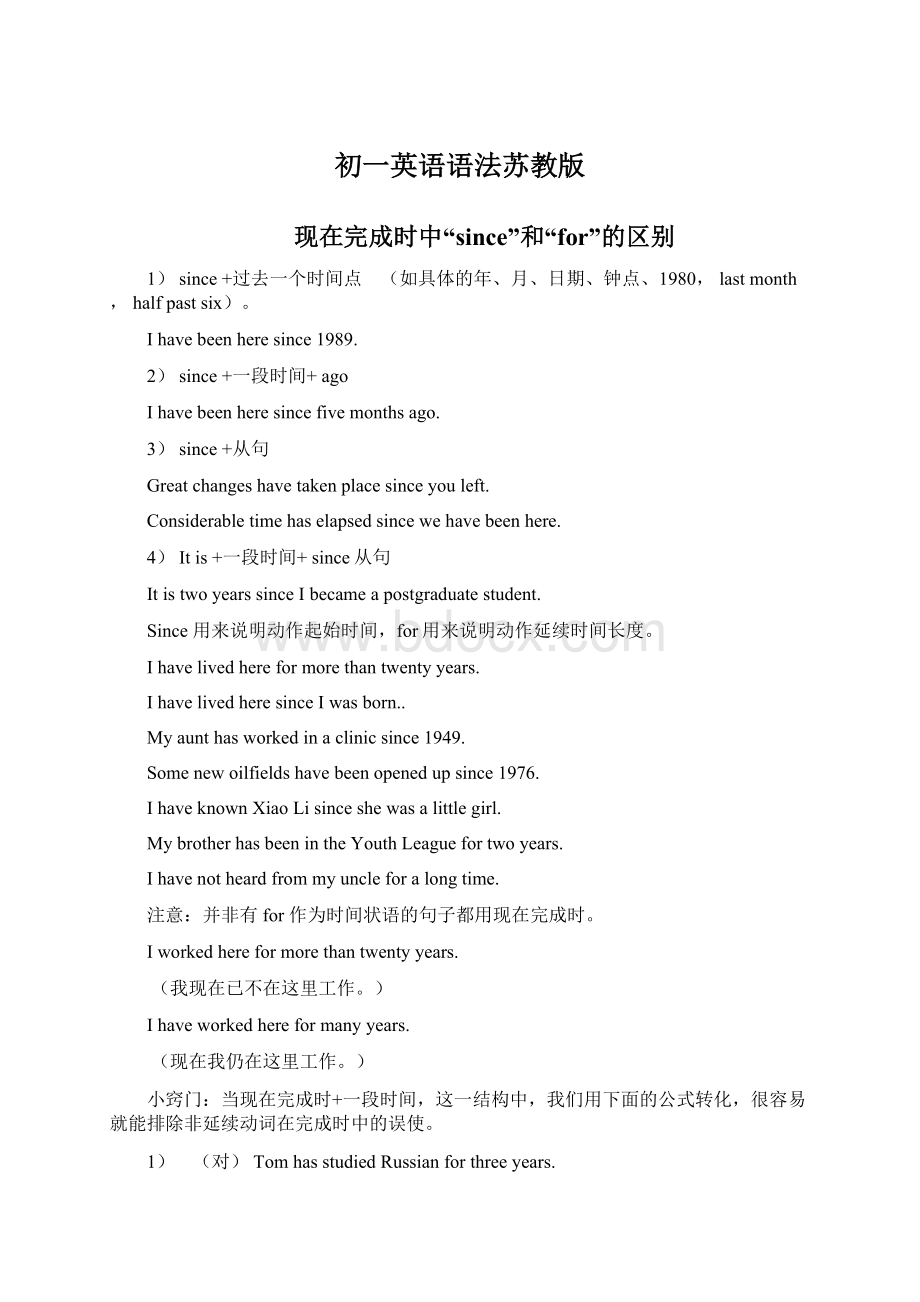初一英语语法苏教版.docx
《初一英语语法苏教版.docx》由会员分享,可在线阅读,更多相关《初一英语语法苏教版.docx(57页珍藏版)》请在冰豆网上搜索。

初一英语语法苏教版
现在完成时中“since”和“for”的区别
1)since+过去一个时间点 (如具体的年、月、日期、钟点、1980,lastmonth,halfpastsix)。
Ihavebeenheresince1989.
2)since+一段时间+ago
Ihavebeenheresincefivemonthsago.
3)since+从句
Greatchangeshavetakenplacesinceyouleft.
Considerabletimehaselapsedsincewehavebeenhere.
4)Itis+一段时间+since从句
ItistwoyearssinceIbecameapostgraduatestudent.
Since用来说明动作起始时间,for用来说明动作延续时间长度。
Ihavelivedhereformorethantwentyyears.
IhavelivedheresinceIwasborn..
Myaunthasworkedinaclinicsince1949.
Somenewoilfieldshavebeenopenedupsince1976.
IhaveknownXiaoLisinceshewasalittlegirl.
MybrotherhasbeenintheYouthLeaguefortwoyears.
Ihavenotheardfrommyuncleforalongtime.
注意:
并非有for作为时间状语的句子都用现在完成时。
Iworkedhereformorethantwentyyears.
(我现在已不在这里工作。
)
Ihaveworkedhereformanyyears.
(现在我仍在这里工作。
)
小窍门:
当现在完成时+一段时间,这一结构中,我们用下面的公式转化,很容易就能排除非延续动词在完成时中的误使。
1) (对)TomhasstudiedRussianforthreeyears.
=TombegantostudyRussianthreeyearsago,andisstillstudyingitnow.
2) (错)Harryhasgotmarriedforsixyears.
=Harrybegantogetmarriedsixyearsago,andisstillgettingmarriednow.
显然,第二句不对,它应改为Harrygotmarriedsixyearsago. 或Harryhasbeenmarriedforsixyears.
声音:
sound,noise与voice的区别
sound表示听起来像……和like连用,如:
It`ssoundslikeabird.听起来像鸟在叫。
voice表示嗓音,说他的嗓音很动听,用hisvoicewasgood.
noise是杂音,响动的意思。
如:
我听到有动静。
Iheardanoise.
这是一组与“声音”有关的名词,在使用上有区别。
sound泛指自然界各种各样的声音,不论其高低、是否悦耳等。
如:
Iheardthesoundofrunningwater.我听见流水声。
Lighttravelsfasterthansound.光比声音传播得快。
noise表示“噪音、喧闹”,指的是人们不愿听到的声音或嘈杂声。
它可以作可数名词,也可以用作不可数名词。
如:
Iheardsomestrangenoiseslastnight.昨夜我听见一些奇怪的响声。
There'salotofnoisehere.这个地方人声嘈杂。
voice用于人时,指说话、歌唱或发笑的声音,也可指发言权。
用于其它方面时,常含悦耳之声,如鸟鸣声,乐器声音等。
如:
Pleasespeakinaloudervoice.请大声说。
说:
tell,speak,say,talk的区别
tell意为“告诉、讲述”,指某人把某一件事、一条信息传送给别人或讲述一件事。
tellsbsth意为“告知某人某事”。
tellsbtodosth意为“告诉某人去做某事”。
speak意为“说话、讲话”,后面主要接语言。
speakto意为“和.....讲话、谈话”。
speakof意为“提到、说起”。
speaktosbaboutsth
talk意为“谈话、讲话”,如果只有一方对另一方说话时,一般用talkto;如果双方或多方交谈,多用with。
talkabout意为“谈论......”。
haveatalkwith意为“与......交谈”。
say意为“说”。
saysthtosb意为“对......说”。
Itissaidthat...意为“据说”。
首先是say:
之后要有说的内容,如Hesaidnothing.
▲say一般作及物动词用,着重说话的内容,它的宾语可以是名词,代词或宾语从句。
eg:
Hecansayhisname.他会说他的名字。
PleasesayitinEnglish.请用英语用。
She`ssaying,Don`tdrawonthewall.她在说“别在墙上画”。
▲speak强调说的动作,不强调所说的内容。
作及物动词时,常以某种语言作宾语。
作不及物动词时,常见的搭配形式有:
speakofsomething/somebody谈到某事(某人)speaktosb跟某
人讲话,此外speak还可用于在较为正式的场合了表演讲或演说。
CanyouspeakJapanese?
你会说日语吗?
Sheisspeakingtoherteacher.她正在跟她的老师说话。
Hespokeatthemeetingyesterday.他昨天在会上讲了话。
▲talk一般为不及物动词,意思是“交谈,谈话,着重强调两具之间的相互说话。
eg:
SheistalkingwithLucyinEnglish.
她正在和露茜用英语交谈。
Whatareyoutalkingabout?
你们在谈论什么?
Theteacheristalkingtohim.老师正在和他谈话。
▲tell常作及物动词,意为“讲述,告诉,动词常跟双宾语。
tellsbsth=tellsthtosb告诉某人某事。
eg:
Heistellingthechildrenastory.
他正在给孩子们讲一个故事。
Didyoutellherthenews?
=Didyoutellthenewstoher?
你把这个消息告诉她了吗?
usedto与beusedto
(1)usedto+do:
"过去常常"表示过去习惯性的动作或状态,但如今已不存在。
Motherusednottobesoforgetful.
Scarfusedtotakeawalk.(过去常常散步)
(2)beusedto+doing:
对……已感到习惯,或"习惯于",to是介词,后需加名词或动名词。
Heisusedtoavegetariandiet.
Scarfisusedtotakingawalk.(现在习惯于散步)
将要:
beto和begoingto
beto表示客观安排或受人指示而做某事。
begoingto表示主观的打算或计划。
Iamtoplayfootballtomorrowafternoon.(客观安排)
I'mgoingtoplayfootballtomorrowafternoon.(主观安排)
twice、twotimes
关于ArunstwicefasterthanB这个的翻译,现在都还存在争议。
有的人认为是A的速度是B的2倍,有人认为是A比B快2倍=A是B的3倍。
“A+be+倍数+as+计量形容词原级+as+B”。
表示A是B的N倍。
1.Thistreeisthreetimesastallasthatone.这棵树是那棵树的三倍高。
2.Hisfatheristwiceasoldashe.他父亲的年纪有他两倍大。
两倍用twice,不用twotimes.
注意:
两倍一般都用twice,不用twotimes
例如:
Thistreeistwicehigherthanthatone.
=Thistreeistwiceashighasthatone.
=Thistreeistwicetheheightofthatone.
倍数+比较级+than...=倍数+as+形容词原形+as...=倍数+the+形容词所对应的名词+of...
other、another、others、theother
(1)other后既可接可数名词复数形式又可接不可数名词,如:
可数,otherpencils其它的铅笔,otherstudents其他的学生。
不可数othertea别的/其它的茶,otherinformation别的/其它消息。
anyother其他一切的什么……
(2)theother定指其它的……,其后可接可数名词和单数,如:
theotherbook另外的一本书,
theothermap另一张地图,
其后也可跟可数名词的复数形式,如:
theotherflowers其他的花朵,theotherteachers其它的老师们,还可以接不可数名词,如:
theotherwater剩下的水,theotherbeer别的啤酒
other表“另外的”接复数名词,如与具体数词连用,则置于数词之后,如:
twootherboys;但与定冠词the连用时,other要放在数词前。
如:
theothertwoboys
Tonyisgoingcampingwith_C__boysnextSunday.托尼将于下周日与另外两个男孩一起去野营。
A.littletwootherB.twolittleother
C.twootherlittleD.littleothertwo
MrSmithaskedmetofetchthreeotherrecorders.史密斯先生让我再拿三台录音机来。
(3)others其用法相当于复数名词,此词不能用作定语,表示的意思是“不具体的某些东西”,如:
Thischemicalispoisonous.Othersarepoisonous,too.(others=otherchemicals)
但是如果others前用了the,则表示具体的别的东西。
如:
Idon’twantthesebooks.Pleasegivemetheothers.(theothers=theotherbooks
(4)another,作形容词时,是指在原有的基础上再加一(些),表示“再一(些)”或“另外一个(些)”的意思。
another还可作代词,意思与作形容词时一样。
another+数词=数词+more
eg:
anotherone=onemore
Iwantanotherapple
Iwantonemoreapple
★习惯用法:
oneanother
fromone…toanother
theotherday=afewdaysago
everyotherday/week/year
some…,others…
如:
ImetMr.Smithintheparktheotherday.
前几天我在公园里碰见了Smith先生。
Whileattheuniversity,hewenttothelibraryeveryotherday.
在大学时他每隔一天去图书馆一次。
Somepeoplelikefootball,otherslikevolleyball.
有些人喜欢足球,有些人喜欢排球。
Theyareverydifferentfromoneanother.
他们互相之间差别很大。
WhenAmericansmovedfromoneplacetoanother,theytooktheirdialectswiththem.当美国人从一个地方迁移到另一个地方时,
花费:
pay、spend、cost、take
Sbpaysomemoneyforsth.(人做主语,结构是pay….for)
Sbspentsomemoneyonsth或sbspendsomemoney(in)doingsth
(人做主语,结构为spendon/spendindong)
Sthcostsbsomemoney.(物做主语)
Ittakessbsometime/moneytodosth(形式主语it)
Eg:
我花了五元钱买这本书.( 注意时态用过去时)
Ipaidfiveyuanforthebook. Thebookcostmefiveyuan.
Ispentfiveyuanonthebook=Ispentfiveyuan(in)buyingthebook.
Ittookmefiveyuantobuythebook
cross、across、crossing、through、over
cross是动词
across是介词
crossing是名词
across指在物体的表面穿过
through指在物体的空间穿过
over指崇山峻岭上穿过
在……前面:
infrontof、inthefrontof
infrontof没有范围限制,在整体外部的前面
inthefrontof有一定的范围限制,在整体内部的前面
Eg:
Hesatinthefrontofthebus. (Thebus形成一定的范围)
Hesatinfrontofme.(无范围)
遗忘,忘记:
leave与forget
leave+物+地点。
leave表示“遗忘”,通常只用来表示“把某物忘在某地”。
例如:
CouldIuseyourEnglish-Chinesedictionary?
Ileftmineathome.
我可以借用一下你的英汉词典吗?
我的忘在家里了。
WhenIwenttoschool,Ileftmybooksathome.
当我去上学时,我把我的书忘在家了。
Ileftmybookonthetable.Don'tleavemebehind!
forget+物,不能加地点。
forget的意思是“忘记;忘却”,忘记某事或忘记做某事。
例如:
Iforgotmailingtheletter.我忘记了寄过这封信。
(信已寄出)
Iforgottomailtheletter.我忘记寄这封信了。
(信未寄出)
漂亮的:
beautiful、handsome
beautiful指女性
handsome指男性
inhospital inthehostipal(在医院)这类词有很多,加the不加the不一样
inhospital指生病住院
inthehospital指在医院工作或去探视
attable(在吃饭=havingmeals) atthetable在座子旁边仅指位置
携带,带:
bring、take、carry、fetch
bring指带来
take指带走
fetch指去取回来
carry指搬运重物
some肯定句 already肯定句 and肯定句 too肯定/疑问句
any否定/疑问句yet否定/疑问句or否定/疑问句either否定句
good well都有“好”之意 good是形容词well是副词
many much都是“大量的”many+可数名词复数much+不可数名词
toomany、toomuch、muchtoo大量的,没有manytoo词组
toomany+可数名词复数
toomuch+不可数名词
muchtoo+形容词、副词
每一个的:
each、every
each可以和of连用
every指三者以上的每一个,不能和of连用
both指两者都
all大于等于三者
eithe指两者中的任意一个
neither指两者中的一个也没有
none指三者中的一个也没有
find找的结果 see看的结果 hear听的结果
lookfor找的动作
lookat看的动作
listento听的动作
和:
and、with
And是连词,能做并列主语
with是介词,不能做并列主语,谓语跟with修饰的主语保持一致。
希望:
hope—wish
hope不能加人在加todo,而wish可以.
hopetodo=wishtodo hope+that从句=wish+that从句
因为:
because、becauseof
because+句子 becauseof+短语
到达:
arrive、getto、reach
arrive不及物,到达某地要加介词in/at in+大地方at+小地方
Stoptodo–stopdoing停止做某事 (类似的词也很多)
stoptodo指停止一件事情去做另一件事情
stopdoing指停止正在做的事情
puton—wear—in—dress
puton指穿的动作wear指穿的状态in是介词in+颜色dress+人
从前:
ago-before
ago是过去时的标志
before是完成时的标志
few—little—afew—alittle
Few表示否定+可数名词复数 afew表示肯定+可数名词复数
Little表示否定+不可数名词复数 alittle表示肯定+不可数名词复数
整个的:
whole、all
whole用在the之后all用在the之前
借:
borrow-lend
borrow指借入,规则动词,过去式,过去分词:
borrowed,borrowed,常用于borrowsthfromsb
lend是借出,不规则动词,过去式,过去分词:
lent,lent;常用短语:
lendsthtosblendsbsth(通常跟双宾)
单独的:
alone、lonely
alone单独并不孤独,主要强调目前是一个人的状况,没有同伴。
lonely单独还有情感上的孤独,主要强调孤独、寂寞的感觉。
I'malone.表示我现在是一个人,但是不一定觉得孤独,可能我在看电视或者什么的,觉得很不错。
I'mlonely.表示我很孤独,也许身边有不少朋友,但是没有人理解我,所以还是会觉得孤独。
所以你可以说Ilivealone,butidontfeellonely!
“我独自住着,但并不感到孤独!
”
如此:
such、so
①so+形+a/an+名=such+a/an+形+名。
即:
such+名词 so+形容词/副词。
so副词,意思是“如此、这样”,后面常接形容词或副词;such形容词,意思是“如此、这样”,修饰名词,即可接可数名词,也可以接不可数名词。
例如:
It’ssuchafineday.
It’ssofineaday.
②so+many/much/few/little+形+名。
如果复数名词前有few,many等形容词;不可数名词前有little,much等形容词,就必须用so,而不能用such,例如:
Thecamelhadsuchalongneck.骆驼长着那样长的脖子。
Don’tmakesomuchnoise!
别那么大声嚷嚷。
③such+形+不可数名词/可数名词复数
除了,除…之外:
except、beside
except指在整体中除去一部分
beside指除…之外还有……
真实的:
true、real
true指正确与错误;real指真假
bemadeof、bemadefrom、bemadein、bemadeby
bemadeupof由……构成,由……组成
bemadeof由….构成能看出原材料来(衣服类的全部用bemadeof)
bemadefrom由….构成看不出原材料bemadeinto被制成…..
bemadein+地点
bemadeby+人
intheway、ontheway、bytheway
intheway挡道,妨碍
ontheway在…的路上
bytheway顺便问一下
begoodfor、begoodat
begoodfor对……有益
begoodat擅长…=dowellin
sometime、sometimes、sometime、sometimes
sometime将来的某段时间,将来的某一天。
或者是,一些时间的意思,给我一些时间……一段时间。
提问:
Whenwillyou.....
sometimes许多次,是oncetwice的累加。
提问:
Howmanytimesdoyou......
sometimea.以前的,某一时间;ad.改天,来日。
提问:
Whendidyou....
sometimesad.有时=attimes,是一般现在时的标识。
提问用Howoftendoyou.....
例句与用法:
Aftertheexplosionitwassometimebeforethetownresumeditseverydayroutines.
爆炸后经过相当一段时间,这个城镇才恢复了正常的生活秩序。
Afterwehadhaggledforso